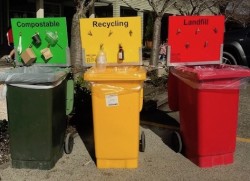Solid waste
Different regions of New Zealand have different rules when it comes to recycling. Talk to your council and local providers to get a clear understanding of what can be recycled in your area (and what happens to the waste that is recycled).
Ensure you have the correct bins. Place clear signage around the bins so your team and visitors know exactly what can go in them. Signage should include a combination of words and pictures – or even better, examples of what can/can’t go into each bin.
Familiarise yourself with the pickup days for recycling or make a plan (perhaps in combination with other businesses) to take recycling to the depot.
Some things are recycled in some areas but not others (soft plastics, aluminium, batteries etc). Perhaps you could team up with other businesses and come up with a plan to collect and recycle other items.
Example: The George Hotel in Christchurch has an initiative to recycle all aluminium products across five hotels. The George kitchen staff now wash used aluminium foil and fold it into tiny squares, to be stashed alongside squashed aluminium cans and all screw caps from wine bottles. A Lions Club service group collects the aluminium, sells it and the proceeds go to a charity for children with kidney disease.
And don't forget, recycling is just one of the 6 R’s when it comes to waste: Rethink/Reinvent, Refuse, Reduce, Re-use/Repair, Recycle, Replace. An even better option is to avoid the waste in the first place!
Helpful Resources
Mutu
Why buy when you can borrow? Mutu is a peer-to-peer rental marketplace app which allows you to rent or lend almost anything.
Living Waste-Free
A guide from recycle.co.nz on the 6 R's of waste - and tips for living waste-free.
How to write a waste minimisation plan
This article takes you through 9 steps to writing a waste minimisation plan for your business.

